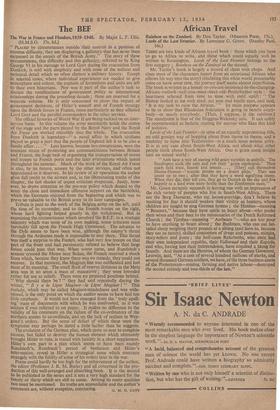The BEF
The War in France and Flanders,1939-1940. By Major L. F. Ellis. (H.M.S.O. 37s. 6d.)
'
"PLACED by circumstances outside their control in a position of extreme difficulty, they are displaying a gallantry that has never been surpassed in the annals of the British Army." The story of these circumstances, this difficulty and this gallantry, referred to by King George VI in his message to Lord Gort during the evacuation from Dunkirk, is told with simplicity and with none of the tedious and technical detail which so often clutters a military history. Except in selected cases, where individual experiences are needed to give atmosphere and colour, the exploits of formations and units are left to their own historians. Nor was it part of the author's task to discuss the ramifications of government policy or international relationships during the preceding decade; * these are reserved for a separate volume. He is only concerned to show the impact of government decisions, of Hitler's assault and of French strategy upon the British forces in France, more particularly as they affected Lord Gort and the parallel commanders in the other services.
The official histories of World War II are being tackled on an inter- service basis. In this volume the army necessarily holds the centre of the stage and the parts played by the Royal Navy and the Royal Air Force are worked smoothly into the whole. The evacuation from Dunkirk is legendary—" a naval affair in which civilians played so great a part that the people of England felt it to be also a family affair.... " Less known, because less conspicuous, were the constant strain of protecting. sea communications between Britain and France, the huge task of organising the transportation of stores and troops to French ports and the later evacuations which lasted throughout the summer. Much of the work of the Royal Air Force is also, by its nature, unseen by the other services, and often not appreciated as it deserves. In his review of air operations the author gives full credit to the airmen and, in the illuminating truths of this chapter, the last shades of unjust criticism evaporate. Justly, how- ever, he draws attention to the pre-war policy which denied to the army the close and immediate offensive support on the battlefield, Which the Germans enjoyed from the beginning and which was to prove so valuable to the British army in its later campaigns.
Tribute is paid to the work of the Belgian army on the left, until the time of its surrender, and to the French troops on the right, Whose hard fighting helped greatly in the withdrawal. But in examining the circumstances which involved the B.E.F. in a strategic calamity which was none of its own making, some criticism must inevitably fall upon the French High Command. The advance to the DyIe seems to have been wise, although the enemy's thrust through the Ardennes made it impossible to stay there. This thrust was itself a surprise to the French, who had very few troops on that part of the front and had persistently refused to believe that large forces could pass that way. When worse came, and Rundstedt's armour crossed the Meuse near Sedan, the French received a shock from which, because they knew there was no remedy, they could not recover. In that moment, the Maginot line was outflanked and lost most of its meaning. The small flock of reserve divisions in the Metz area was in no sense a mass of manceuvre ; they were intended rather for use as reliefs. There were no prepared positions behind. " Why should there be ? " they had said repeatedly during the winter, " 11 y a la Ligne Maginot—la Ligne Maginot I " This malady, which may be called Maginot-mindedness and was wide- spread, is the only point on which the author seems to have laid too little emphasis. It would not have emerged from the 'truly apall- mg' mass of documents with which he was confronted, as it was seldom if ever referred to on paper. It makes no difference to the validity of his comments on the failure of the co-ordinators of the northern armies to co-ordinate, and on the lack of realism in Wey- gand's orders. But the sense of defeat of which these were the symptoms may perhaps be dated a little earlier than he suggests.
The evolution of the German plan, which came so near to complete success, but failed to destroy the human element which ultimately brought Hitler to ruin, is traced with lucidity in a short supplement. Hitler's own part in a plan which 'seems to have been mainly Rundstedt's, Rundstedt's period of hesitation and Hitler's Intervention, reveal in Hitler a strategical sense which contrasts strangely with the futility of some of his orders later in the war,


































 Previous page
Previous page